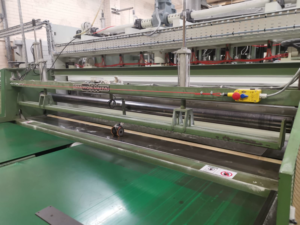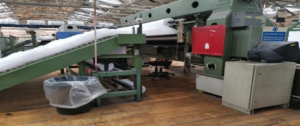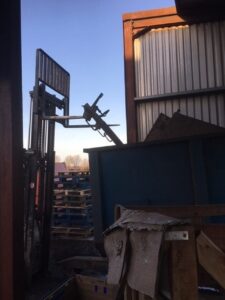Farmer fined after friends had to climb tree to escape cow attack
- Woman left with broken ribs and life-changing internal injuries
A woman and her friend had to climb up a tree to escape an attack by more than a dozen cows on a public right of way in North Yorkshire.
Janicke Tvedt and David Hood had set out on a popular circular walk from Masham with pet Labrador Goose, who was on his lead, on 25 July 2021. Part of their walk took them across the fields and public rights of way near Shaws Farm.
The farmer responsible has been prosecuted by the Health and Safety Executive (HSE) as a result. Advice and guidance for farmers, landowners, and other livestock keepers is available.
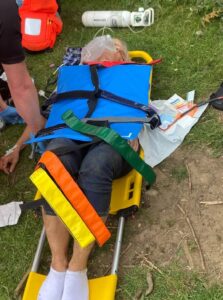
After entering a field off Foxholme Lane, the pair noticed several cattle in a field the path cut across, including cows with calves, so decided to give them a wide berth, passing through a narrow opening in a hedge. However, as they did, they then spotted a lone cow with two calves, and within seconds their dog was attacked.
Although they all managed to get away, they were soon cornered by other cows and 57-year-old Ms Tvedt was knocked to the ground and trampled. She was helped up by her friend, but at a nearby tree they found themselves surrounded by around 15 cows and had to climb a tree to escape a further attack.
Ms Tvedt was airlifted to hospital suffering seven broken ribs, hoof marks on her chest and legs, a broken thumb, and life changing severe internal injuries that required emergency surgery. She remains severely restricted in her mobility almost three years on, but is keen to share her experience to help raise awareness of the dangers posed by cattle in fields with public rights of way.
“I had the imprints of hoof marks, bruises, cuts and grazes all over my body,” she said.
“I was convinced that if I fell asleep, I would never wake up.
“I still have anxiety when on walks in the countryside and am always on alert for the presence of cattle.
“We live in a rural community and there are lots of footpaths around the fields in the area and I do not want other peoples lives to be at risk.
“I want to ensure the emphasis of my story is to improve awareness of the dangers of cows, particularly those in fields with footpaths.
“I am determined not to take on the mantle of being a victim as it’s disempowering.”
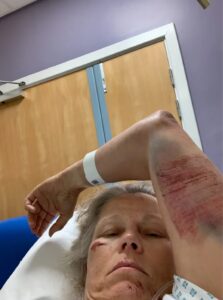
An investigation by the Health and Safety Executive (HSE) found that livestock were being kept in a field with a public right of way across it and insufficient measures were taken to protect members of the public from cattle and calves. A sign warning the public of the cattle had been destroyed and not replaced.
Cows are known are known to be protective of their calves and unpredictable. They can pose a risk to walkers, especially to those with dogs.
Key considerations for farmers and landowners include:
- where possible avoid putting cattle, especially cows with calves, in fields with public access.
- do all that they can to keep animals and people separated, including erecting fencing (permanent or temporary) e.g. electric fencing.
- Assess the temperament of any cattle before putting them into a field with public access.
- Any animal that has shown any sign of aggression must not be kept in a field with public access.
- Clearly sign post all public access routes across the farm. Display signage at all entrances to the field stating what is in the field (cows with calves / bulls).
Martin Falshaw of Falshaw Partners, Shaws Farm, Swinton, Ripon, North Yorkshire pleaded guilty to breaching Section 3 (2) of the Health & Safety at Work etc Act 1974. The company has been fined £770.50 and ordered to pay £4,539 in costs.
After the hearing, HSE principal inspector Howard Whittaker said: “The injuries sustained by Janicke have been devastating and completely changed her life.
“However, given the nature of the attack, the end result could have been far worse and resulted in two people losing their lives.
“Public knowledge – and concern – is increasing about how dangerous cattle can be. We completely echo the countryside code which urges walkers to beware of the dangers. On this occasion, the pair tried to stay well away.
“Cattle are extremely protective of their calves and even calm cattle can become aggressive if they think the calves may, in any way, be threatened, even by members of the public walking past.
“Where possible, farmers should avoid putting cattle, especially cows with calves, in fields where members of the public have a legal right to walk.
“Had Martin Falshaw followed this advice, or effectively segregated the cattle, this incident could have been prevented.”
This prosecution was brought by HSE enforcement lawyer Rebecca Schwartz and supported by paralegal officer Lucy Gallagher.
Notes to Editors:
- The Health and Safety Executive (HSE) is Britain’s national regulator for workplace health and safety. We prevent work-related death, injury and ill health through regulatory actions that range from influencing behaviours across whole industry sectors through to targeted interventions on individual businesses. These activities are supported by globally recognised scientific expertise.
- More information about the legislation referred to in this case is available.
- Further details on the latest HSE news releases is available.
- Advice for farmers, landowners and other livestock keepers on dealing with the risks posed by cows with calves is available
